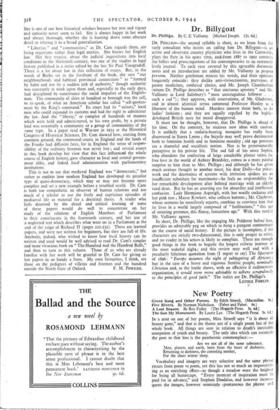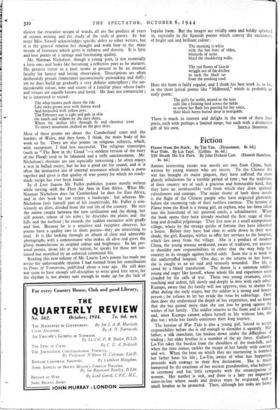New Poetry
A Lost Season. By Roy Fuller. (The Hogarth Press. 3s. 6d.) The Sun My Monument. By Laurie Lee. (The Hogarth Press. 3s. 6d.)
IN a note" on one of her poems, Miss Sitwell says "it is about all beauty gone," and that is the theme not of a single poem but of the whole book. All things are seen in relation to death's inevitable usurpation of youth and beauty. The only idea which can reconcile
the poet to that loss is the pantheistic commonplace:— -
Are we not all of the same substance, -Men, planets and earth, born from the heart of darkness, Returning to darkness, the consoling mother,
For the short winter sleep.
Vocabulary and imagery are very selective and the same phrase recurs from poem to poem, yet this has not so much an impoverish- ing as an enriching effect—as though a meadow were the brighter for being all buttercups. "Every moment of inspiration must be paid for in advance," said Stephen Daedalus, and however inconse- quent the images, however seemingly spontaneous the phrase and
elusive the evocative stream of words, all are the product of years of serious writing and the study of the craft of poetry. In her notes Miss Sitwell acknowledges specific debts to other writers, but it is the general relation her thought and work bear to the main stream of literature which gives it richness and density. It is lyric and love poetry of a strange and fascinating quality.
Mr. Norman Nicholson, though a young poet, is not essentially a lyric one, and looks like becoming a reflective poet as he matures. His greatest virtue as a poet seems at present to be an unusual faculty for honest and loving observation. Descriptions are often deliberately prosaic (sometimes unconsciously painstaking and dull); yet he does build up gradually a very definite atmosphere ; the un- mistakeable colour, tone and accent of a familiar place whose faults and virtues are equally known and loved. He does not romanticise ; he is interested to record : The whin bushes push above the tide Like rocks grown over with thorny weed And barnacled with yellow eyes.
The February sun is tight and pale as skin On hazels and willows by the slaty shore, Where the skyline lifts through fir and chestnut trees To snowy mountains chalked on the grey skies.
Most of these poems are about the Cumberland coast and the borders of Wales, and they form, I think, the main body of his work so far. There are also -poems on religious subjects, which, with exceptions, I find less successful. The religious transcripts (such as "The Bow in the Cloud "—a modern version of the story of the Flood) tend to be laboured and a trifle sanctimonious. Mr. Nicholson's rhythms are not especially interesting ; he often enjoys a trot in ballad metre, but he has a good ear for sound, and it is often the instinctive usc of internal assonance which holds a poem together and gives it that quality of true poetry for which no ready- made recipe has ever been found.
In A Lost Season Mr. Fuller publishes poems mostly written while serving with the Fleet Air Arm in East Africa. What Mr. Norman Nicholson does for Cumberland he does for East Africa, and in this book he too creates a landscape : but whereas Mr. Nicholson feels himself part of his countryside, Mr. Fuller is con- sciously an alien, divided from the real life of the country. He sees the native caught between the new civilisation and the dying, but still potent, taboos of his tribe ; he describes the plains and the hills and the harbour ; he records the sudden encounter with giraffe and lion. Because he is a sensitive and receptive observer, his poems have a quality rare in short poems—they are interesting to read. It is like looking through an album of clear and admirable photographs with a commentator who makes all alive and gives the glossy monochrome its original colour and brightness. In his per- sonal poems, about life at the station, he speaks for those not sus- tained but mortified by an enforced communal life.
Reading this new volume of Mr. Laurie Lee's poems has made me revise the unfavourable opinion I had formed from his contribution to Poets of Tomorrow, published about a year ago. He still does not seem to have enough self-discipline to write good free verse, for the rhythm is not always sure enough to make up for the lack of 'regular form. But the images are vividly seen and boldly splashed in, especially in the Spanish poems which convey the excitement of bright sun and brilliant colour : The morning is white with the hot frost of elder, bli772rds of scent blind the shuddering walls.
The red flames of lizards wriggle out of the ditches to suck the black tar from the smoking road.
Here the form is fairly regular, and I think his best work is, so far, in the short lyrical poems like "Milkmaid," which is probably an early poem: The girl's far treble, muted to the heat calls like a fainting bird across the fields to where her flock lies panting for her voice, their black horns buried deep in marigolds.
There is much to interest and delight in the work of these four poets, each with perhaps a limited range, but each with a distinctive



























 Previous page
Previous page